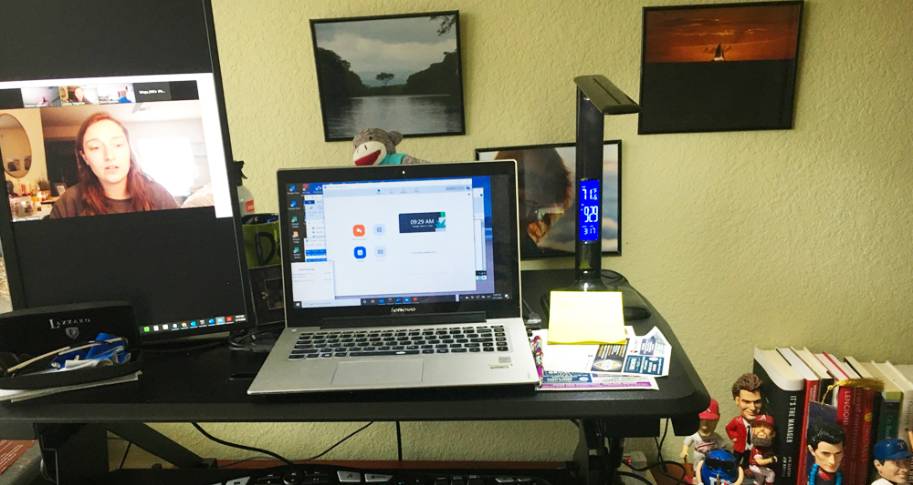Stuck at Home? Here’s How to Make the Best of It

March 17, 2020 | By Stephen Caldwell
My typical guest blog for Walton Insights involves lots of research and interviews, along with the occasional dash of personal experience. In other words, I’m the messenger, not the expert. But it occurs to me that I just might be an expert on a topic that could benefit students, professors and a growing number of professionals.
How to effectively work from home.
In light of the health crisis that has gripped our nation and much of the world, many businesses are sending workers home and students are moving from the classroom to online environments. This is new to many people. For me, it’s business as usual, at least as it applies to where I do my work. Other than a three-year tour of duty with a company that produces and sells corporate training, I’ve been working at home as a writer-for-hire for the better part of 12 years. So I’m pretty familiar with all the challenges and benefits that come with a commute that only involves a single flight of stairs.
There’s no one way to succeed at working from home, but here are a few things that help me stay productive and moderately sane:
- Create a “work” environment. Don’t work from your couch or your bed. Don’t sit in a comfy chair with daytime television in the background. Set up an area that looks and feels like it’s a place where work happens. My office is in an upstairs spare bedroom. I have a desk with my computer, two screens, a bunch of bobble-heads, a sock monkey my wife gave me and a stack of books I need to read. I moved my office a year or so ago to a room with more natural light because it gives me energy and peace and reminds me that I don’t work at Walmart’s corporate office.
- Plan your day. I have a start time (7:30 a.m.) and a lunch break (12:15 p.m. to 12:45 p.m.) and a quitting time (5:30 p.m.), and I’m generally pretty good about honoring those hours. I also have a rolling to-do list, and a spreadsheet I used to keep track of my time. I end each day by planning what I’ll do the next day, and I start each day be reviewing that plan. For me, it helps to work in blocks of at least two hours at a time. And I never allow myself more than 15 minutes between tasks, otherwise I’ll get sucked into the vortex of social media and never emerge. At the same time, I recommend using the occasional break for something that’s not work-related. Stretch. Do some pushups. Watch a video of a cat befriending a squirrel. For me, it used to involve reading social media updates about Arkansas sports. I don’t know what I’ll do now.
- Work on work. Some people tell me they couldn’t work from home because they’d be too tempted to do chores around the house like laundry. I can’t say that’s ever been a problem for me. But I will say that it’s important to make it a priority to work on the things that are work. If you wouldn’t do it in a classroom or in your office building, don’t do it at home.
- Remind yourself that you’re accountable. This is closely related to the previous tip. As a contractor, I only get paid when I’m working. It’s good to remind myself that playing 8 Ball Pool on my phone isn’t working because no one is paying me to make a tricky bank shot. Personally, my faith compels me to “work as unto the Lord,” so that’s an even higher standard of accountability than a client who is sending me a check.
- Interact with people. The hardest part of working from home for me is that I can’t bounce ideas off of other people or interact with them in a social manner. I’m not super social, but I like hearing how other people are doing in life from time to time. I have to be intentional about having human interactions. I text my wife 5-10 times a day, for instance, just to see how she’s doing or to tell her I love her. Don’t text my wife, but you might text someone you care for. I also have phone calls and video meetings during the day with clients. I only do that when it serves a purpose for the project, but it’s also helpful to hear their voices.
The main key to working from home is to develop and exercise some discipline. There are distractions and temptations, and there are times when we all give in to them. If you give into them too often, you’ll get very little done and you won’t enjoy the experience. But if you plan the work and work the plan, you’ll be satisfied with the results and enjoy the journey.

